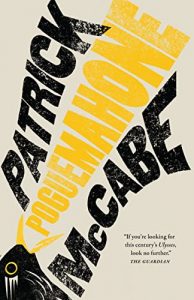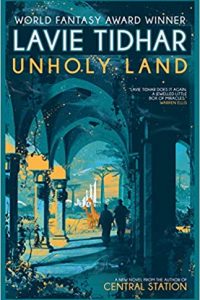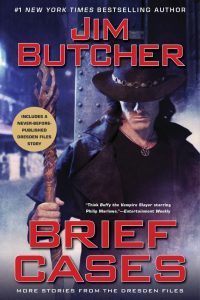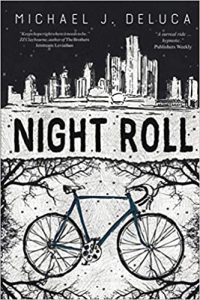Ian Mond Reviews Poguemahone by Patrick McCabe
 Poguemahone, Patrick McCabe (Unbound 978-1-80018-111-3, £20.00, 624pp, hc) April 2022. (Biblioasis 978-1-77196-473-9, $21.95, 600pp, tp) May 2022.
Poguemahone, Patrick McCabe (Unbound 978-1-80018-111-3, £20.00, 624pp, hc) April 2022. (Biblioasis 978-1-77196-473-9, $21.95, 600pp, tp) May 2022.
Weighing in at more than 600 pages and written entirely in free verse, I can understand that some readers will be a little intimidated by Patrick McCabe’s 13th novel, Poguemahone. I’m here to tell you that despite the comparisons to Ulysses and Ducks, Newburyport, despite the Gaelic salted through the text, despite it taking fifty pages to get my bearings, I gulped Poguemahone down in three days. It does help that as preparation, I read McCabe’s break-out novel, The Butcher Boy, which was shortlisted for both the Bram Stoker and Booker Prize in 1992 and was adapted into a movie (apparently a very good one, I’ve not seen it) by Neil Jordan. It gave me an appreciation for McCabe’s singular voice, hallucinogenic imagery, embrace of Irish vernacular, and biting sense of humour. That’s not to say you need to do the same. Poguemahone (loosely translated from the Gaelic as “kiss my arse”) stands on its own, an immersive story of gruagachs, blackbirds, bohemians, Mott the Hoople, and the Cliftonville Capers All-Star Repertory Troupe.
Dan Fogarty’s ballad for his sister, Una, begins as if mid-way through a conversation:
Oh yes, that’s what they’ll tell you that the women are worse than the men by far & whether or not that’s true I am sorry I have to say that I do not know but I’ll tell you this yes, this one thing I’ll tell you that it certainly is when it comes to our Una….
If we’re initially left confused by the lack of context, we are swept along by the musical quality of Dan’s monologue, surrounded by so much typographical white space (which I can’t reasonably replicate in the quote above). Gradually, we come to understand that Una and Dan were adopted; that their mother, Dots Fogarty, committed suicide; that the Fogarty family were exiled from their hometown of Currabawn in Ireland, and forced to make England (“Albion”) their home. We also come to realise, though Dan skips around this point, that Una is in a care home in Margate (the matron is a “dead ringer for Margaret Rutherford”) where she has dementia magnificently imagined as Baron von Richthofen “cruelly looping in and out of her memory as he rat-a-ta-tats and splinters her soul even further.”
However, the bulk of Poguemahone takes place in the 1970s, the period Una spends living with a small community of artists and revolutionaries in a London squat, “aka The Mahavishnu Temple.” There she falls in love with Scottish poet Troy McClory, whose only defining feature (at least according to Dan, who’s no fan of the man’s poetry) is that he looks like Ian Hunter, the lead singer of Mott the Hoople. While McClory openly exhibits his love for Una, in private he and the other women who reside in the squat mock her weight, referring to her as the “Big Fat Fudge” or the “Goodyear Blimp.” That’s not the worst of it, though. There’s seems to be a spirit, a gruagach, haunting the skirting boards of the squat, an evil entity that may have been responsible for one of the girls, Tanith Kaplinski, throwing herself from a fourth storey window.
It’s only recently, through the extraordinary work of Bernadine Evaristo and Salena Godden, that I’ve come to value the cadence and polyphonic delights of free verse or prose poetry. Poguemahone stands as another exceptional example of the form. McCabe strips away the conventional rules of prose – no paragraph breaks and limited punctuation – and exposes us to the unfiltered thoughts of Dan Fogarty: a torrent of memories and anecdotes, underlined by feelings of resentment, mockery, and love toward his sister. Yes, it is initially discombobulating, a blur of disconnected stories and eccentric characters with little sense of time or place. Still, the richness of the language keeps you reading until, almost subconsciously, you become attuned to Dan’s singular voice. I have no idea how McCabe pulls this off – it has all the hallmarks of a magic trick – but that startling moment of clarity does bring everything before it into sharp focus.
Given the sprawling nature of Poguemahone, a review of this length can’t adequately unpack the multiple themes the novel explores. For example, I could easily spend a couple of pages discussing McCabe’s lively, eclectic portrait of London in the 1970s: the music, the art, the feelings of “Love anarchy & revolution,” the perceived threat of IRA bombings. Alternatively, I could dissect his use of Irish folklore, especially the frequent appearance of a singing blackbird (“londubh”), symbolic of reincarnation and a soul trapped in purgatory. And as an avowed lover of horror, I’m sure I could ramble on endlessly about how McCabe – drawing on The Exorcist for inspiration – expertly ratchets up the tension and fear as the gruagach takes a stranglehold on the “The Temple.” But if I did all that, I wouldn’t have the room to speak about Una Fogarty. Her tragic arc provides Poguema hone with its through-line and its emotional centre. As with every other aspect of the novel, our view of Una is coloured by her brother’s skewed perspective. He sees her as hapless and lovelorn, whether it be her undying love for Troy or her attempts to establish a repertory troupe with a group of octogenarians. But when Dan “The Rambling Man” ceases to circle the truth, beginning with the story of his mother, who was forced into prostitution and who committed suicide after a botched abortion, a separate picture of Una emerges, a tragic, devastating story of a woman who, mirroring her family’s exile from Ireland, is betrayed, and rejected by the people, the community, she believed loved and cared for her.
Poguemahone is a stunning novel, one of those exceedingly rare books that deserve to be described as a masterpiece.
Ian Mond loves to talk about books. For eight years he co-hosted a book podcast, The Writer and the Critic, with Kirstyn McDermott. Recently he has revived his blog, The Hysterical Hamster, and is again posting mostly vulgar reviews on an eclectic range of literary and genre novels. You can also follow Ian on Twitter (@Mondyboy) or contact him at mondyboy74@gmail.com.
This review and more like it in the May 2022 issue of Locus.
 While you are here, please take a moment to support Locus with a one-time or recurring donation. We rely on reader donations to keep the magazine and site going, and would like to keep the site paywall free, but WE NEED YOUR FINANCIAL SUPPORT to continue quality coverage of the science fiction and fantasy field.
While you are here, please take a moment to support Locus with a one-time or recurring donation. We rely on reader donations to keep the magazine and site going, and would like to keep the site paywall free, but WE NEED YOUR FINANCIAL SUPPORT to continue quality coverage of the science fiction and fantasy field.
©Locus Magazine. Copyrighted material may not be republished without permission of LSFF.







